
September 9, 2021
HARRISBURG – September 9, 2021 – Regional organizations aimed at reducing community violence and drug abuse have been awarded more than $2.6 million in state grants, with more help on the way, state Sen. Jim Brewster announced today.
“These grants represent an installment on a long-term commitment to help groups in our communities continue their valuable work and to find new approaches and ideas to help residents feel safer in their communities,” Brewster said. “There will be more help available by the end of the year, and I urge organizations to begin the process of securing financing in this next round.”
Brewster, who fought for additional funding in the most recent state budget for anti-violence efforts, said applications for that new funding are now being accepted by the Pennsylvania Commission on Crime and Delinquency (PCCD). To find out more on how to apply, click here.
Interested applicants can access application resources through PCCD’s Gun Violence webpage under the “Grants & Funding” tab. PCCD is utilizing a single online survey form (via SurveyMonkey) for the initial funding request application. An informational webinar will also be hosted on September 14, at 11 a.m. for interested applicants.
The window to apply is open now through Friday, October 15, 2021. Awards will be announced at the December 1, 2021 School Safety and Security Committee meeting, with projects slated to begin January 1, 2022.
The following organizations have been awarded funding through PCCD programs:
- Brothers and Sisters Emerging – Community Programs – $150,000 Awarded through the JJDPC State Violence and Delinquency Prevention Program Funds
- Three Rivers Youth Inc. – LifeSkills Training Planning Project – $100,000 Awarded through the JJDPC Federal State Opioid Response (SOR) Funds
- Allegheny County Chief Executive Officer – Allegheny County Jail MAT Methadone Program – $150,000 Awarded through the CJAC Opioid Response Funds
- Allegheny County Chief Executive Officer – Latent Prints Continuous Improvement Project – $9,853 Awarded through the CJAC Byrne Justice Assistance Grant Funds
- Allegheny County Office of the Medical Examiner – Firearms Examination Initiative – $224,945 Awarded through the Gun Violence Reduction Grant Program
- Allegheny Intermediate Unit – School- based and Community Outreach Program – $225,000 Awarded through the Gun Violence Reduction Grant Program
- Center for Victims – Family and Community Support Team Funding – $225,000 Awarded through the Gun Violence Reduction Grant Program
- Community Empowerment Association, Inc. – Gun Violence Prevention and Community-based Outreach Efforts – $225,000 Awarded through the Gun Violence Reduction Grant Program
- Greater Valley Community Services – Violence Prevention in Braddock and Surrounding Areas – $200,000 Awarded through the Gun Violence Reduction Grant Program
- Healthy Village Learning Institute – Proactive Prevention and Intervention Processes through the P.O.W.E.R. (Positive Outcomes With Excuses Removed) Prevention Program – $211,680 Awarded through the Gun Violence Reduction Grant Program
- South Pittsburgh Coalition for Peace – Peacemakers Street Outreach Intervention Initiative – $220,000 Awarded through the Gun Violence Reduction Grant Program
- The Center that CARES – Enhancing the REACH Initiative Prevention Program – $220,000 Awarded through the Gun Violence Reduction Grant Program
- Voices Against Violence – Programing for Street Mediation, Conflict Resolution, and Restorative Justice Practices – $177,000 Awarded through the Gun Violence Reduction Grant Program
- Legacy Arts Project – Drums Not Guns Youth Art Apprenticeship Program – $205,750 Awarded through the Gun Violence Reduction Grant Program
- Allegheny County Chief Executive Officer – Decreasing Gun Violence through the CURE Model – $71,388 Awarded through the CJAC Gun Violence Reduction Funds
- City of McKeesport – McKeesport Gun Violence Reduction Project – $50,500 Awarded through the CJAC Gun Violence Reduction Funds

September 2, 2021
McKeesport, September 2, 2021 – State Sen. Jim Brewster has written to Pennsylvania’s legislative leaders asking for a September vote on his perks reform package, including elimination of ‘per-diem’ payments.
In a letter dated August 19, the key lawmaker, who has introduced similar bills in previous sessions of the General Assembly, said the vote should be a follow-up to the recent move by legislative leaders to make more expense information available online.
“Increasing public access to expenses is a welcomed and needed step. I certainly support the effort. However, expense transparency alone does not go far enough,” Brewster wrote. “To increase accountability, the General Assembly needs to swiftly move to eliminate ‘per diem’ payments and institute other necessary reforms.”
Brewster said that blanket per-diem payments don’t provide the transparency on spending that the public is asking of public officials and his legislation would require receipts for expenses instead.
In addition to the elimination of the controversial per diem payments (SB362), Brewster’s legislation, now sitting idle in the Senate State Government Committee, includes:
SB 361 – Replaces yearly, automatic cost-of-living adjustments (COLA) by a once-per-decade raise consideration following the decennial U.S. Census and calculated by the Consumer Price Index.
SB 363 – Ends state vehicle leases for members of the General Assembly, instead reimbursing for actual mileage and tolls for documented government travel.
SB 364 – Bans gifts of any value to members of the General Assembly. No member could solicit or accept, for their personal use or for another’s use; a gift, favor, entertainment, hospitality, loan, or any other item of monetary value.
Brewster said lagging public confidence in the General Assembly demands action on the bills, at the very least a floor vote when the Senate returns to session in several weeks.
“I am confident that if the leadership of our respective bodies would allow their members to decide the issue, the outcome would favor the transparency you profess to seek,” Brewster wrote. “Therefore, I request that the reform package – including the measure that ends ‘per diem’ payments – be scheduled for consideration in September.”

August 24, 2021
Allegheny County, August 23, 2021 – Sen. Jim Brewster (D-Allegheny/Westmoreland) and Rep. Jessica Benham (D-Allegheny) will host a free, on-site shredding event for residents of their shared Legislative District on Saturday, August 28, from 9am– 11am. The event will be held at the Brentwood Community Center at 3501 Brownsville Road, Pittsburgh
“In this day and age, identity theft and consumer fraud have unfortunately become more common,” said Brewster. “This is an opportunity to protect your personal information and safely destroy confidential documents.
The shredding event is for individuals only, documents from businesses will not be accepted. Each vehicle is being asked to bring no more than three boxes. Examples of items to bring include bank and credit card statements, tax documents, insurance claim forms, medical records, retirement fund information, and any other documents with social security numbers or other personal and identifying information. Only paper documents will be accepted, no binder clips or books. Document shredding will occur in a truck on-site with the shredded paper later taken to a recycling facility.
“I am happy to help constituents protect their personal information with this shredding event,” Benham said. “If you can’t make it, please remember that personal information should be kept safe and secure until it can be properly discarded. When destroying personal information, it should be shredded or safely burned in a firepit or fireplace.”
The Greater Pittsburgh Community Food Bank will be accepting non-perishable food items (no glass) during the shredding event, though a donation is not required to participate. There will also be a prescription drug take back occurring at the event for those interested in safely disposing of expired or unneeded medicine.
For more information or questions about the event, please contact Kathy Jo Osman in Sen. Brewster’s office at 412-664-5200 or Moira Kaleida in Rep. Benham’s office at 412-881-4208.
###

August 23, 2021
McKeesport – August 22, 2021 – State Sen. Jim Brewster (D-Allegheny/Westmoreland) today said he is thrilled with McKeesport’s Swin Cash’s induction into the WNBA Hall of Fame.
Cash, who starred at McKeesport High, was an integral member of the University of Connecticut women’s basketball teams that dominated the sport. The team won two national championships while Cash played for the Huskies.
“Swin Cash is an outstanding basketball player who dominated the sport at every level,” Brewster said. “Even more importantly, Swin comes from a great family, she is an exceptional person and a tremendous role model.
“Over the years, she not only demonstrated remarkable skills on the court, but she also worked very hard to become a terrific player – an all-time great.”
When Cash finished her collegiate career, she was selected in the WNBA draft by the Detroit Shock. Over the years, she played for multiple teams that won multiple championships. Cash also won two Olympic gold medals in 2004 and 2012.
“Those of us who watched Swin play through the years were not surprised that she has reached such heights in the world of women’s basketball,” Brewster said. “She demonstrated her commitment to succeed and compete at the highest levels early in her career.
“The entire McKeesport community is proud of Swin’s induction into the WNBA Hall of Fame and we send congratulations for this incredible honor,” Brewster said.
Cash currently serves as vice-president of basketball operations for the New Orleans Pelicans.
###

August 12, 2021
Allegheny County – August 12, 2021 – State Sen. Jim Brewster announced today a comprehensive new effort to deliver services and support to veterans across the 45th Senate District. The initiative will provide face-to-face guidance at five locations, supported by a retired Army major on Brewster’s staff.
“For a vast majority, serving our country provides an outstanding skill set for application in civilian life,” Brewster said. “But there are some who need support in making the transition, sometimes years after their service. We want to make sure we recognize their sacrifice with the care and consideration they deserve.”
While Pennsylvania provides a broad array of support services for its nearly one million veterans, Brewster’s initiative will seek to put that information in one place and take it to convenient locations across the district.
“We are fortunate to have experience on our staff in military service and navigating the various state and federal programs designed to help our veterans,” Brewster said. “I hope people will spread the word to friends and family that we will be in the neighborhood soon sharing that experience.”
At each location, Brewster’s office will provide help with filing for federal (Veterans Administration) benefits, signing up for health care, finding housing support, seeking employment or support in the justice system. Retired U.S. Army Major Bill Roland will oversee the outreach. Roland has 26 years of Army service and a bachelor’s degree from Carlow University. Anyone with questions can reach him at 412-664-5200.
Services will be provided at the following locations:
First Wednesday of Each Month | 3 – 5 pm
EAST MCKEESPORT VFW POST 8430
1200 Broadway Avenue | East McKeesport
Second Wednesday of Each Month | 3 – 5 pm
CLAIRTON VFW POST 803
911 N State Street | Clairton, PA
Third Wednesday of Each Month | Noon – 3 pm
BRENTWOOD VFW
3801 Saw Mill Run Boulevard | Brentwood, PA
Third Thursday of Each Month | 3 – 5 pm
NORTH BRADDOCK AMVETS POST 60
1135 Wolfe Avenue | Braddock, PA

August 6, 2021
McKeesport, August 6, 2021 – Sen. Jim Brewster (D-Allegheny/Westmoreland) announced today that 12 schools in the 45th District will receive grant funding, awarded by the U.S. Department of Agriculture’s Fresh Fruit and Vegetable Program (FFVP).
“Fruits and vegetables help our children physically and play an important role in their development,” Brewster said. “Proper nutrition allows them to thrive as students and prepares them with healthy eating habits for the rest of their lives.”
Pennsylvania was the first state to utilize the FFVP in 2004. The program was expanded to all 50 states by 2008. The goal of the FFVP is to create healthier school environments by promoting nutrition education and to positively impact the long-term health of students.
The schools in Sen. Brewster’s district receiving funds include:
- Allegheny IU3’s Sunrise School
- Duquesne City School District’s Duquesne Elementary School
- East Allegheny School District’s Logan Elementary School
- Kiski Area School District’s East Primary School
- McKeesport Area School District’s Francis McClure Elementary School
- McKeesport Area School District’s Twin Rivers Elementary School
- South Allegheny School District’s Elementary School
- West Mifflin Area School District’s Clara Barton Elementary School
- West Mifflin Area School District’s Homeville Elementary School
- Woodland Hill’s School District’s Edgewood Elementary STEAM Academy
- Woodland Hill’s School District’s Turtle Creek Elementary STEAM Academy
- Woodland Hill’s School District’s Wilkins Elementary STEAM Academy

July 28, 2021
McKeesport, July 29, 2021 – With the federal eviction moratorium expiring at the end of the week, state Sen. Jim Brewster is urging local renters and landlords whose income was affected by the pandemic to immediately file for federal funds made available through the American Rescue Plan (ARP) and intended to help with both rent and utilities.
“Congress put this money into the federal relief package to make sure people don’t lose their homes or their utilities due to the pandemic,” Brewster said. “But thousands of eligible Pennsylvanians still haven’t applied, and much of the relief money remains unused. I hope people will get the word out to friends and neighbors before it’s too late.”
In June, the Biden Administration announced it was extending the Centers for Disease Control’s national moratorium on evictions to stem the spread of COVID-19. That extension expires Saturday (July 31). The federal government earmarked $25 billion for the Emergency Rental Assistance Program, which applies to both landlords and tenants.
“If a landlord is considering eviction, I urge them to see if they and their tenant qualify for emergency assistance. It would make life easier on everyone and it doesn’t cost anything to check eligibility,” Brewster said.
Pennsylvania received $569 million through the program and much of it is still available to applicants through the Department of Human Services which has, in turn, contracted with organizations in each county to accept applications and administer the funds.
In addition to rent, the aid is available to help pay electric, gas, water, internet, and trash removal among other necessities.
The federal Consumer Financial Protection Bureau has created a web tool to help folks find the proper agency for their county.
In Allegheny County, residents can click here for information, or call 412-248-0021. In Westmoreland County residents can use the CFP finder tool, or call 724-539-3550.

July 28, 2021
McKeesport, July 28, 2021 – Sen. Jim Brewster (D-Allegheny/Westmoreland) announced the reopening of his permanent satellite offices in Turtle Creek and North Versailles beginning on August 3, 2021.
“After a very difficult year and a half for everyone, I am happy to announce my office services will be available again in Turtle Creek and North Versailles,” Brewster said. “I look forward to continuing and improving the services that are offered and the help that my staff and I provide.”
The senator’s district offices have been instrumental in helping constituents apply for essential state programs and services including, property tax relief, rent rebate programs, the Low-Income Home Energy Assistance Program (LIHEAP), the Pharmaceutical Assistance Contract for the Elderly program (PACE), senior bus passes, and many others.
“With these offices reopening, residents can better access the programs and services they need with the assistance of my office staff,” Brewster said.
Satellite office locations and hours of operation are:
- Turtle Creek Borough Building, 125 Monroeville Avenue, Turtle Creek, every Tuesday, 9:00am – 4:00 pm; and
- North Versailles Township Building, 1401 Greensburg Avenue, North Versailles, every Wednesday, 9:00am – 4:00 pm.
Brewster also reminds residents that his district offices are open in Monroeville, McKeesport and New Kensington, Monday through Friday, 8:30am until 4:30pm.
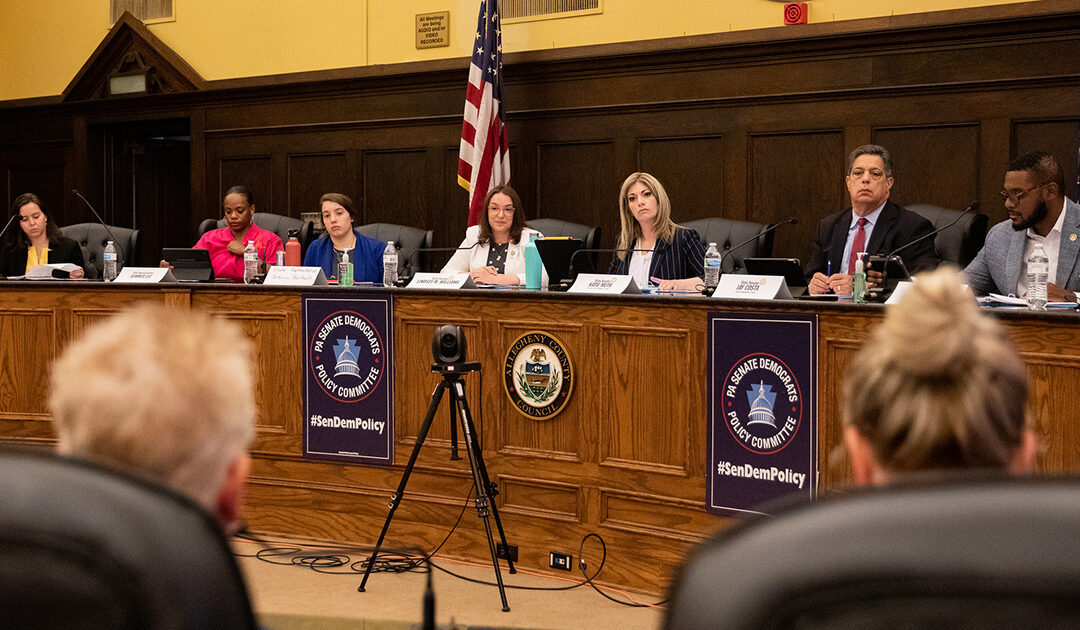
July 21, 2021
Harrisburg – July 21, 2021 – At the request of Pennsylvania Senate Democratic Leader Jay Costa (D- Allegheny), Sen. Wayne Fontana (D- Allegheny), Sen. Jim Brewster (D- Allegheny/Westmoreland), Sen. Lindsey Williams (D- Allegheny), & House Representative Austin Davis (D- Allegheny), the Pennsylvania Senate Democratic Policy Committee held a hybrid in person and virtual public hearing to discuss the healthcare workforce crisis in Pennsylvania. The pandemic exposed the many problems with staffing in our healthcare systems that must be addressed.
“I am extremely grateful that the Senate Democratic Policy Committee, in partnership with the incredible health care workers of SEIU, are continuing the conversation about the immediate need to address the staffing crisis in Pennsylvania healthcare settings,” Sen. Costa said. “My family was incredibly thankful for the care that my mother received when she was in a nursing home setting, and that standard of care should be afforded to every Pennsylvanian. Safe staffing levels, union protections, and livable wages are essential to addressing this workforce crisis.”
Sen. Fontana continued, “The pandemic put the gaping holes in our current healthcare system on full display. The staff in our hospital systems, our nursing homes, and our home care aides worked tirelessly before this pandemic – and were lifelines during the pandemic. We must address the pay inequities that healthcare workers face and assure that these essential workers have the workplace protections that they deserve.”
As the pandemic put a strain on health care systems across the country, staff became increasingly scarce as quarantines and infection rates rose at an alarming pace. In November 2020, approximately nine months into the pandemic, staffing shortages existed in hospitals within at least 25 states. Many employees had to choose between working and caring for their children during pandemic-induced school closures. Additionally, the fear of contracting COVID-19 or passing it to family members, the surging influx of patients and the extended work hours plagued healthcare staff across-the-board. A survey conducted by Mental Health America from June to September demonstrated 93% of healthcare workers were stressed, 85% were experiencing anxiety, 77% were frustrated, 76% were burned out and 75% felt overwhelmed.
During the hearing, nurses and health care workers discussed historic challenges they faced during the pandemic and ongoing challenges that have existed in their profession long before COVID-19 became a public health crisis. Panelists and legislatures also pointed out the correlation between improved patient outcomes and good working conditions and pay. They highlighted the need for more data to prove the benefits of good working conditions that unions like SEIU fight for.
“There is no excuse for allowing healthcare professionals – who are giving lifesaving care – to work in substandard conditions where they are not making a living wage. Good jobs create strong communities, and these workers deserve the union security, workplace protections, and comparable wages for the professionals that they are and the work that they do,” Sen. Brewster said.
“Good union jobs are shown time and again to improve the lives of individuals and improve the communities where union families live. Fighting for union security, safe staffing levels, and livable wages that our healthcare workers deserve will not only create better outcomes for patients where these workers serve – it creates stronger and more prosperous communities as a whole,” Sen. Lindsey Williams said.
“Across the country, health disparities between white and Black people have been narrowing — but the opposite is true in Allegheny County. We know why: the over-concentration of the Black community in local service occupations and in particular, healthcare. Like the manufacturing industries that preceded it, healthcare relies on understaffing and cost-cutting at the frontlines to support high executive pay, expansion and profits. This model intensifies disparities and creates worker *and* community burnout and instability. These problems cannot be solved using current managerial strategies. Healthcare systems are the perfect example of why healthcare workers need a voice on the job. Our charitable healthcare dollars are funding an unsustainable business model, and it’s time for a change,” said Silas Russell, Vice President at SEIU Healthcare PA.
“I am incredibly grateful to hold this hearing today and to continue the conversation about the need for workplace protections and union security for our healthcare professionals. They truly were essential the past year and several months as we fought through the pandemic, but their work has been and will continue to be the keystone to ensuring high-quality patient care. The pay, benefits, protections, and respect through safe staffing levels or our healthcare workers should absolutely reflect the lifesaving work that they do,” Sen. Katie Muth (D- Berks/Chester/Montgomery), chair of the Senate Democratic Policy Committee, said.
Below are all who participated in today’s hearing:
- Erin Williams, Respiratory Therapist, Allegheny General Hospital
- Christoria Hughes, Dietary, UPMC Presbyterian
- Kim Hitrik, Registered Nurse, West Penn Hospital
- Katrina Rechtenwald, Registered Nurse, Allegheny General Hospital
- Silas Russell, Vice President and Political Director, SEIU Healthcare PA
- Theresa Brown, PhD, RN, Nurse and author of the New York TimesBestseller The Shift: One Nurse, Twelve Hours, Four Patients’ Lives
- Gabriel Winant, Author, The Next Shift: the Fall of Industry and the Rise of Healthcare in the Rust Belt
- Jeff Shook, Assistant Professor of Social Work and Law at University of Pittsburgh
Senators who attended this hearing in person and virtually included Senate Democratic Leader Jay Costa (D- Allegheny), Sen. Katie Muth (D- Berks/Chester/Montgomery), Sen. Wayne Fontana (D- Allegheny), Sen. Jim Brewster (D- Allegheny/Westmoreland), Sen. Lindsey Williams (D- Allegheny), Sen. John Kane (D- Chester/Delaware), Sen. Tim Kearney (D- Chester/Delaware), Sen. Shariff Street (D- Philadelphia), and Sen. Maria Collett (D- Bucks/Montgomery). House Members in attendance included Rep. Austin Davis (D- Allegheny), Rep. Dan Miller (D- Allegheny), and Rep. Emily Kinkead (D- Allegheny).
The full recording of this roundtable, as well as the written testimony from participants, can be found at senatormuth.com/policy. A full recording of this hearing can also be found on the PA Senate Democratic Facebook page.
###

July 20, 2021
McKeesport, July 19, 2021 – State Sen. Jim Brewster has been named “Sportsman of the Year” by the Elizabeth Township Sportsmen Association (ETSA), the group announced Saturday.
Brewster, who serves as Democratic Chair of the Senate Game and Fisheries Committee, said he was grateful for the recognition and the work the nearly 50-year-old group does in the local community.
“The Elizabeth Township Sportsmen Association has been providing recreational and educational opportunities for local residents since 1972 and their mission goes well beyond their onsite shooting ranges,” Brewster said. “I’m deeply grateful to be recognized by its members and their families.”
The 1000-member ETSA provides education and safety training programs for owners of firearms as well as community outreach and fundraising for a variety of causes.
“In a world of virtual and electronic entertainment, ETSA helps keep the community connected with its roots and the joys of nature,” Brewster said. “Preserving the natural environment is not only a recognition of where we’ve come from, but it’s also the only way to preserve a healthy future.”
The award comes on the heels of Brewster’s recognition by the century-old Allegheny County Sportsmen League which noted his commitment to its mission and also his “Legislator of the Year” award presented by the Pennsylvania Federation of Sportsmen & Conservationists, Inc.
“As Democratic Chair of the Game and Fisheries Committee, I’m always looking for ways we can preserve and expand opportunities for Pennsylvanians to get away from their computers, get outdoors and relax,” Brewster said.
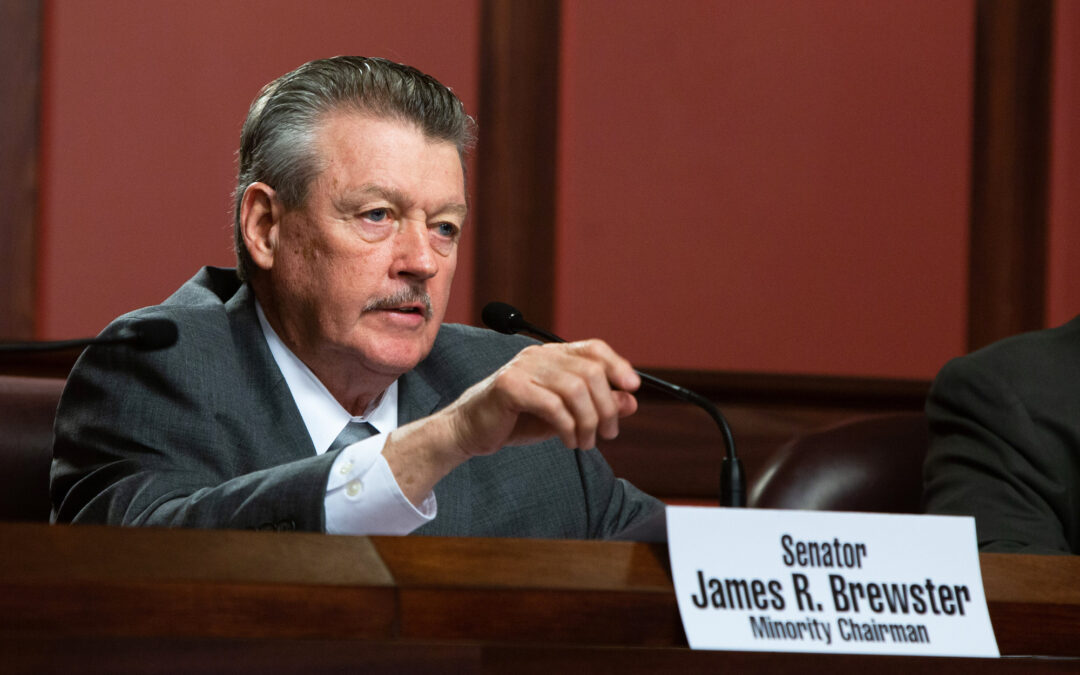
July 6, 2021
McKeesport, July 6, 2021 – In addition to funding from previous years, State Sen. Jim Brewster announced today that schools in the 45th Senate District will receive an added $10,684,245 for the next fiscal year, including $3 million in new “Level-Up” supplements targeted to help traditionally underfunded districts.
“This additional funding comes at a critical time for local school districts,” Brewster said. “We are still recovering from a pandemic that ravaged our state, and I hope to see the additional funding for education alleviate the pressure on taxpayers. The residents who fund our public education system by paying property taxes should not see an increase in their taxes – that was one of my goals while advocating for this additional funding.”
In all, the state’s 2021-2022 spending plan increases school funds by more than $300 million across Pennsylvania, including $100 million in the new Level-Up program.
“Our school funding system has too long created winners and losers among students in different – sometimes neighboring – districts,” said Brewster, a member of the Senate Education Committee. “Quality of schools and pay for teachers shouldn’t depend on zip code. Every child deserves the same chance to succeed, and this budget takes a big step toward equity. All of the schools in my district will see a substantial increase in funding, and some schools will get supplemental funding in addition to the traditional allocation. That’s a win.”
“I was happy to help shepherd these increases for public education through the Legislature to pass a budget on time without raising taxes.”
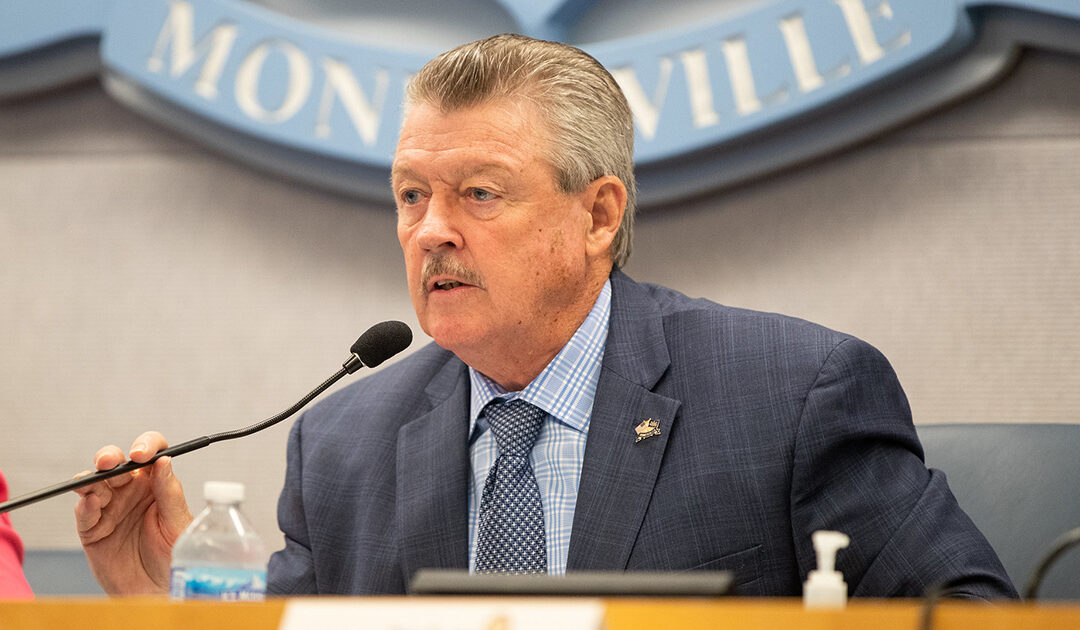
June 25, 2021
HARRISBURG, June 25, 2021 – With help for pandemic-stricken Pennsylvanians falling far short of needs, state Sen. Jim Brewster said today he voted to approve Pennsylvania’s state budget because it meets one of his priorities: getting help to struggling Pennsylvanians immediately.
“It’s disappointing to me that we would stash money in a vault when it’s needed out on Main Street,” Brewster said. “The pandemic left small businesses, schools, and essential workers struggling to stay afloat and the majority in Harrisburg wants to keep the life preservers on the boat. I don’t get it.”
At the same time, Brewster said, a long budget impasse could be even worse.
“We’ve said all along that we wanted to send relief immediately and that will happen,” he said. “But we will continue to talk with those who are struggling to find ways to loosen Harrisburg’s grip on federal stimulus funds that rightfully belong to those hurt by the pandemic. This isn’t over.”
The budget takes steps toward fair funding for schools but falls short of the goals Brewster and other Democrats had laid out for a $3 billion surplus and $7 billion federal stimulus. Much of that funding is set aside for future needs in the budget agreement passed late Friday.
“I will continue to fight for more money, fairly distributed, for schools, businesses and vulnerable individuals,” Brewster said. “As we move forward, tangible results from these investments will be the best argument for additional resources.”
Setting aside $2.5 billion in the Rainy Day Fund, and reserving most of the federal stimulus for future use, the spending plan contains no tax increases and injects $300 million in additional funds for K-12 education.
Brewster said the $200 million over four years for higher education does not provide adequate resources to avoid cuts and consolidation for the Pennsylvania State System of Higher Education, but the surplus set aside means students, faculty and residents of affected communities still have an opportunity to make their voices heard.
“No one can say there’s no money to help our state schools,” Brewster said. “We can still let the General Assembly know that value-oriented college education is a priority that deserves consideration when there is money stashed away in a vault.”
Increased education line items this year include:
- $300 million in basic education
- $200 funded through the Fair Funding Formula
- $100 million for Level Up, a new effort provide funding for schools that have been historically underfunded
- $20 million for Ready to Learn block grants
- $25 million for Pre K Counts
- $5 million for Headstart
- $50 million for special education
- $11 million for early intervention
- $200 million for PASSHE, over 4 years, including funding for the Diversity, Education & Inclusion program proposed by Senate Democrats.
“The work doesn’t end because at the constitutional deadline to pass a budget,” Brewster said. “Allies in the General Assembly and advocates across the state are gearing up for continued effort to expand educational opportunities for all students at all levels. We’ve taken some steps but there’s a long way to go.”

June 25, 2021
HARRISBURG, June 25, 2021 — By a wide, bipartisan margin, the state Senate today approved a proposal by state Sen. Jim Brewster to help counties create a fund to remediate blighted properties and restore communities.
“Run-down buildings and abandoned properties bring down the value of entire neighborhoods and promote more decay,” Brewster said. “We need to give local government the tools they need to tear down, fix up and restore blighted neighborhoods.”
Senate Bill 574 will establish a demolition and rehabilitation fund in each county through a fee collected from sheriff sales or mortgage foreclosures. The fee will be capped at $250.
In addition to the purchase price, the bureau conducting the sale of the property or the sheriff in a mortgage foreclosure will collect the fee.
“Cash-strapped local communities need help to rebound from years of decline and population shifts,” Brewster said. “With the housing market exploding and young people looking for a more convenient urban lifestyle, the time is right to make key investments.”
The fund established may be used by the county, any not-for-profit or pro-profit corporation that has a contract with the county or a taxing district, redevelopment authority, land bank or other government entity, for the demolition or rehabilitation of blighted property located in the county.
The bill is the second Brewster authored measure to pass the Senate this week. It now heads to the House.
###

June 24, 2021
HARRISBURG, June 24, 2021— The Pennsylvania Senate today unanimously approved a bill by Sen. Jim Brewster aimed at helping veterans and others in recovery by waiving license fees for recreational fishing.
Senate Bill 241, introduced by Brewster in February, will exempt the cost of fishing licenses in Pennsylvania for veterans and other individuals taking steps towards physical or mental recovery as part of therapeutic recreation events or programs.
“Fishing, like all outdoor recreation, is healthy fun, healthy for the economy and we now know that it can be an important part of the health of thousands of Pennsylvanians trying to overcome challenges,” Brewster said. “I’m looking forward to seeing hundreds of events across Pennsylvania that provide opportunities for recreational and therapeutic angling.”
The bill would provide for a dedicated exemption for individuals participating in therapeutic angling programs sponsored by various established service groups, such as Project Healing Waters and Wounded Warriors.
The Pennsylvania Fish and Boat Commission estimated that in 2018, more than 60 different service organizations and hundreds of unique one-day fishing opportunity events across the Commonwealth would have qualified for exemption under the provisions of Brewster’s bill.
The bill now goes to the House.

June 21, 2021
Harrisburg, Pa. – June 21, 2021 − After Republicans failed to pass a clean, bipartisan bill to extend mixed drinks to go for restaurants and taverns, the Pennsylvania Senate Democrats are introducing legislation that will provide the opportunity for bars, taverns and restaurants to extend some of the emergency provisions of the disaster declaration.
Under leadership of the Senate Democrats, the General Assembly passed statutes that permitted restaurants to sell mixed drinks to go, sell alcohol outside in contiguous areas, expand off premise catering permits, and receive other waivers and discounts on fees, which we were under the protections of a disaster declaration.
When Republicans ended the disaster declaration with a concurrent resolution in early June, they did nothing to prepare for restaurants to continue these activities – despite knowing the hospitality industry would be harmed.
“The Senate Democratic Caucus is fighting to help the hospitality industry recover from the past year of hardship,” said Senate Democratic Leader Jay Costa. “And we’re hopeful that the Senate Republicans will join us – instead of capitalizing on the pain of the small business community.”
Instead of passing House Bill 1154, which enjoyed bipartisan support in the House and Senate, Senate Republicans added a political amendment to privatize our liquor system – with no hearings or expert testimony.
“Republicans continue to politicize the tragedy of the COVID-19 pandemic, and frankly I think Pennsylvanians are fed up of their talking points,” said Senator Wayne D. Fontana. “They campaigned hard to end the disaster declaration and misled folks on what that meant. Many restrictions were already ended, but their hasty and partisan end to the declaration is hurting small business owners.”
Members of the Senate Democratic Caucus will introduce amendments and a new bill to permanently enshrine the permissions granted under the COVID-19 disaster declaration, without tying this aid to partisan tricks.
The amendments will continue the following emergency permissions:
- Mixed drinks to go
- Ability to sell in contiguous areas outside of the licensed premises
- Increase in the wholesale discount from 10% to 15%
- Allow an unlimited number of off premise catering permits
- Waive safekeeping fees
- Ability for closing restaurants and taverns to sell their liquor inventory to other liquor licensees
“Since July of last year, I have been asking my Republican colleagues to support these measures,” said Senator Jim Brewster. “I keep hearing from restaurants and taverns in my district that they want these things to continue. They’re tired of excuses from Harrisburg; there’s no reason we can’t get this done for them.”
“The hospitality industry has been decimated over the past 15 months, and this immense hardship transcends all party lines and allegiances. Workers and small businesses are still reeling from the pandemic and need, and deserve, our support,” said Senator Nikil Saval. “These amendments will benefit people and communities throughout our Commonwealth that these businesses sustain, and simultaneously allow for the continued reimagining of how residents get to experience our streets and communal spaces.”
These amendments are in addition to the New Deal for Pennsylvania plan that the caucus put forth in May, which includes $2.47 billion in spending of the state’s allocation from the American Rescue Plan for people-focused recovery, including business assistance, job training and workforce development.
More information on the New Deal proposal can be found at pasenate.com/newdeal
Previously, the Senate Democrats fought for and secured $145 million in assistance for the hospitality industry in the form of grants in January of 2021, paid for with federal funding from the CARES Act.
###

June 10, 2021
McKEESPORT, June 10, 2021 – In a letter sent to top officials this week, state Sen. Jim Brewster urged the Pennsylvania State System of Higher Education (PASSHE) to pause its plans to consolidate system universities to allow more careful and deliberate consideration of the long-term impact.
Brewster is calling for a two-year delay in implementation of the board’s controversial plan to integrate six universities into two to address its financial challenges.
In his letter to Board Chair Cynthia Shapira and Chancellor Dan Greenstein, Brewster said a consolidation “in haste” during the recovery from a global pandemic, could present unforeseen consequences.
“The decision to significantly reorganize how our universities provide education at these institutions should not be done without a great deal of discussion with all stakeholders,” Brewster wrote. “It also should not be considered without fully understanding that actions in haste will have long-lasting deleterious effects or be on the agenda of policymakers in the immediate aftermath of a debilitating pandemic.”
At the same time, Brewster said, a delay would give the General Assembly, now sitting on a $3 billion budget surplus and $7.3 billion in federal pandemic aid, an opportunity to respond to the “wake-up call” that the consolidation plan provided.
“The potential application of new federal resources, in concert with heightened state support may provide a path for bold and progressive action that does not involve consolidation/mergers,” he wrote. “In addition, I believe the merger — as discussed — should serve as a wake-up call for the General Assembly to end years of neglect. It creates a platform for lawmakers to work with our partners at the federal level to make the investment needed in affordable higher education.”
PASHHE is now in the middle of its public comment period over the plans. Citizens can comment by clicking here.
The entire contents of Brewster’s letter can be read here.
###
PASSHE Consolidation-Merger Letter

June 2, 2021
Harrisburg – June 2, 2021 – At the request of Senators Wayne Fontana (D- Allegheny), Senate Democratic Leader Jay Costa (D- Allegheny), Jim Brewster (D- Allegheny/Westmoreland), and Lindsey Williams (D- Allegheny), the Pennsylvania Senate Democratic Policy Committee held a virtual public hearing on how Pennsylvania can best improve care in nursing homes.
“The COVID-19 pandemic was a wakeup call for us all that certain aspects of our society are not equipped to quickly and efficiently respond to crisis, and that many sectors of our society that were already struggling suffered the greatest losses due to the pandemic,” Senator Costa said. “Our nursing homes care for some of the most vulnerable members of our society, and it is imperative that these care facilities are not only equipped to respond to crisis like pandemics, but that even in the best of times they are properly staffed and overseen.”
In her testimony today, Teresa Osborne, Manager of Advocacy & Outreach at AARP PA, said that with nearly 13,300 deaths of Pennsylvanians residing in long-long term care facilities, and with Pennsylvanians 50 and over accounting for 98% of all COVID-19 related deaths, the need for action on this issue is clear.
“Nursing homes during the pandemic struggled to maintain the health and safety of their residents, the health and safe staffing levels of their employees, and family and loved were almost completely shut out of the lives of residents in congregate care settings. We must ensure that nursing homes in the future are prepared for another health crisis, and that these facilities are operating efficiently and to the highest standards at all times,” Senator Fontana said.
Senator Lindsey Williams continued, “Our nursing home residents, their families, and their loved ones have been some of the hardest hit by COVID-19, but these problems don’t begin and end with the current pandemic. We need to do more to protect the health, safety, and emotional well-being of our seniors, and hearing directly from the people who are doing this work every day is a key part of creating legislative policy that will provide the supports needed to accomplish those goals.”
Keshia Williams, a CNA Nursing Home Worker and member of SEIU Healthcare, said today in her testimony that the residents she cares for in nursing homes almost daily become like family, and sometimes residents have no other family to support them – just her and her fellow CNAs and nurses. She said that makes it even harder to deal with the fact that the state only requires 2.7 hours of care for residents in a 24-hour period.
“For decades, we sounded the alarm on chronic and dangerous understaffing and unacceptable conditions for workers and residents. We made do with dwindling resources and demanded lifesaving reform, while the industry increasingly focused on the bottom line, and rampant, unchecked nursing home sales to irresponsible owners drove down standards,” Keshia Williams said.
Dennis Biondo, Allegheny County Executive Director of Kane Community Living Centers, said in his testimony that oversight of nursing home and community care centers is done through surveys by the Pennsylvania Department of Health. He said that this is, “not going to improve nursing home care,” because instead of creating meaningful change they are just a way to check off boxes.
“Pennsylvania Department of Health is charged with the licensure and regulation of nursing homes. The Department’s Office of Quality Assurance oversees this important regulatory oversight of monitoring compliance through surveys, commonly known to the public as facility inspections, to ensure that facilities are providing adequate resident care in compliance with all applicable laws and regulations. This applies to federal law and regulation since, in addition to the department’s role as the state survey entity, it is also contracted by the Centers for Medicare and Medicaid Services (CMS) to serve as the federal survey entity for nursing homes,” Keara Klinepeter, PA Department of Health Executive Deputy Secretary, explained.
Klinepeter said that while survey regulation was required at the federal level in Pennsylvania, and in every state across the U.S., the PA Dept of Health saw during the COVID-19 pandemic the benefits of partnerships between hospitals and medical systems to PA nursing homes through the Regional Response Program funded by CARES Act money. Klinepeter said that efforts are already in place to continue this program through federal grant funding. This will allow nursing homes in Pennsylvania to continue training staff on appropriate public health practices related to pandemic response and beyond.
In response to inquiries about nursing home complaints and surveys that result from those, Klinepeter said that the Dept of Health saw an increase of 23% in surveys in 2020. These surveys also included surveys to inspect facilities use of infection control measures.
Georgia Goodman, Leading Age PA Director of Government Affairs, reiterated the importance of maintaining employee morale and providing adequate and well-paid staff to care for residents.
“Nursing facilities can’t simply raise their prices. Two out of three residents in nursing homes are paid for by the Medical Assistance Program- the government payor that is underfunding care by an average of $80 per resident per day for our members. We are urging support for the direct allocation of $396 million to nursing facilities using the same methodology the general assembly enacted in Act 24 of 2020 to help providers with a number of financial challenges brought on by the pandemic, but none more acute than staffing,” Goodman said.
Goodman also said that her organization was grateful to collaborate on Senate Bill 1268, which offered nurse aides hired temporarily during the pandemic a path to permanent registration on the Nurse Aide registry, and they are supportive of a number of current initiatives like Senate Bill 115 to allow Pennsylvania to participate in licensure reciprocity so that nurses from other states can assist with our state’s healthcare workforce shortages.
“It is despicable that the care of our senior population in Pennsylvania seems to be an afterthought to those in charge of the oversight and guidelines for care in nursing homes and community care facilities. Nursing home complaints, oversight regulations, and the need for safe staffing levels to provide adequate care were an issue before this pandemic. Now that we have seen over 10,000 nursing home residents die of COVID-19, it is clear that Pennsylvania needs immediate and forceful action to protect our seniors and those who live in community care settings,” Sen. Kate Muth (D- Berks/Chester/Montgomery), chair of the Senate Democratic Policy Committee, said.
Below are all who participated in today’s hearing:
- Dennis Biondo, Allegheny County, Executive Director Kane Community Living Centers
- Keara Klinepeter, PA Department of Health, Executive Deputy Secretary
- Dean Owrey, Chief Financial Officer, Vincentian Collaborative System
- Georgia Goodman, Leading Age PA, Director of Government Affairs
- Keshia Williams, CNA, Nursing Home Worker, SEIU Healthcare
- Debbie Winn-Horvitz, President & CEO, Jewish Association on Aging
- Jennifer Costello, Chester County Department of Aging, Long-term Care Ombudsman
- Teresa Osborne, Manager of Advocacy & Outreach, AARP PA
Senators who also attended this hearing include Sen. Sharif Street (D- Philadelphia) and Sen. Maria Collett (D- Bucks/Montgomery).
The full recording of this roundtable, as well as the written testimony from participants, can be found at senatormuth.com/policy. A full recording of this hearing can also be found on the PA Senate Democratic Facebook page.
###
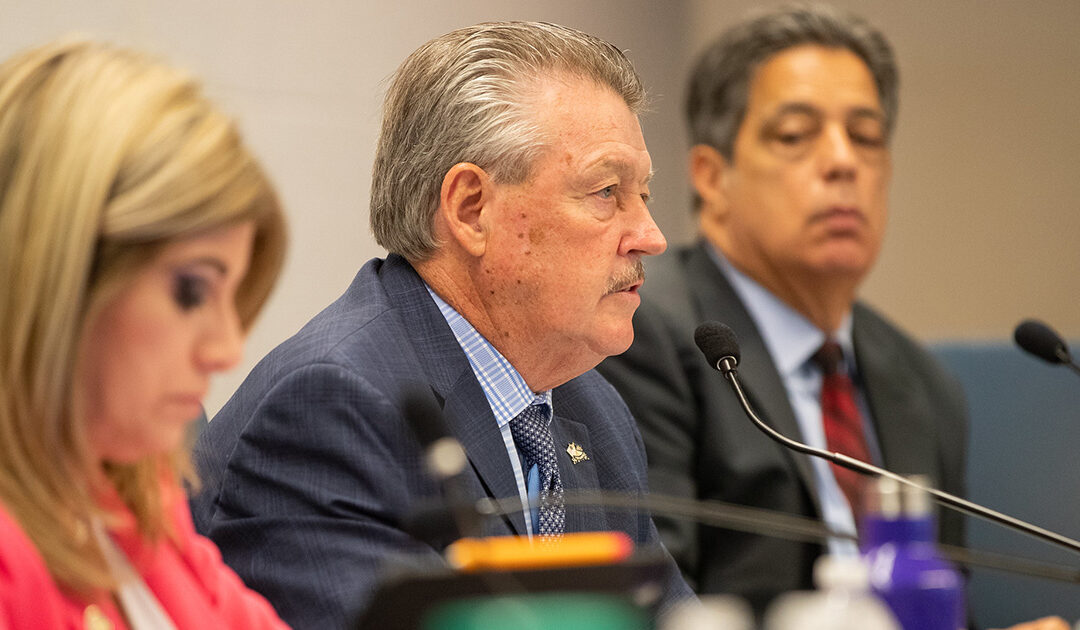
June 1, 2021
Harrisburg – June 1, 2021 – At the request of state Senator Jim Brewster (D- Allegheny/Westmoreland), the Pennsylvania Senate Democratic Policy Committee held a hybrid in person and virtual public hearing to discuss the Mon Fayette Expressway and what this project will mean to the southwest region of Pennsylvania.
“The investment into the Mon Fayette Expressway is not just about building another road, it is very important to understand that what we are doing here is building for the future,” Senator Brewster said. “The Mon Fayette Expressway is crucial in revitalizing the Mon Valley and providing direct and indirect access to family sustaining jobs for generations to come. We must provide this project with the resources that it needs to be completed.”
According to TRIP, a national transportation research group, improving the efficiency of a region’s transportation system by expanding the capacity of highways, transit and intermodal facilities has been shown to enhance economic development opportunities and improve quality of life.
Maury Burgwin, President of the Mon Yough Chamber of Commerce, said that his organization fully supports the Mon Fayette Expressway calling it, “The single most important economic development issue for our region is completion of Mon-Fayette from Route 51 to Interstate 376.”
“The approved route for the expressway north from RT 51 in Large, PA will provide direct highway access to 1600 manufacturing and related firms that employ over 22,000 people,” Burgwin continued.
TRIP research also shows that for every $1 million spent on urban highway or intermodal expansion, an average of 7.2 local, long-term jobs were created at nearby locations as a result of improved access.
The Federal Highway Administration estimates that each dollar spent on road, highway and bridge improvements results in an average benefit of $5.20 in the form of reduced vehicle maintenance costs, reduced delays, reduced fuel consumption, improved safety, reduced road and bridge maintenance costs and reduced emissions as a result of improved traffic flow.
Darrin Kelly, President of the Allegheny County Labor Council, said that his organization is fully supportive of the Mon Fayette Expressway, and they see this project as a continued opportunity to work with the business community of the region, coordinate with the federal government on lifechanging infrastructure improvements for Western Pennsylvania, and to provide long-term family sustaining jobs.
“Jobs in the industry average around $80,000 to $90,000 and that includes great benefits and pensions,” Kelly said.
Thomas Melisko, President, IUOE Local 66 said that with other projects in the region coming to a close, the opportunity for skilled union labor to be utilized in the building, completion, and maintenance of the Mon Fayette Expressway is an excellent opportunity for his union’s almost 8,000 members.
In his testimony, Mark Compton, CEO of the Pennsylvania Turnpike, said that Pennsylvania Act 89 has been instrumental in the allowing projects like the Mon Fayette Expressway to come to fruition.
Brad Heigel, Chief Engineer of the Pennsylvania Turnpike, discussed the need for forward thinking when it comes to the projects like the Mon Fayette Expressway. He said that he has been working with the University of Pittsburgh to analyze the need for electric charging stations along state roads as well as the possibility of electrified roads that will one day charge vehicles as they drive. Heigel also spoke about the need to maintain community engagement and properly inform residents of the construction that will be taking place as part of the Mon Fayette Expressway.
“No one should be blocked from economic opportunity, growth, or prosperity because of where they live. Adequate and well-maintained infrastructure that serves the needs of populations is essential to a successful economy. The Mon Fayette Expressway is an excellent example of building back better and providing resources and opportunity to every Pennsylvanian,” Sen. Katie Muth (D- Berks/Chester/Montgomery), chair of the Senate Democratic Policy Committee, said.
Below are all who participated in today’s hearing:
- Mark Compton, CEO, Pennsylvania Turnpike
- Brad Heigel, Chief Engineer, Pennsylvania Turnpike
- Darrin Kelly, President, Allegheny County Labor Council
- Thomas Melisko, President, IUOE Local 66
- Sean Logan, President, Monroeville Area Chamber of Commerce
- Maury Burgwin, President, Mon Yough Chamber of Commerce
Senators who attended this hearing in person and virtually included: Senate Democratic Leader Jay Costa (D- Allegheny), as well as Senators Sharif Street (D- Philadelphia), Wayne D. Fontana (D- Allegheny), Lindsey Williams (Allegheny), Tim Kearney (D- Chester/Delaware), Maria Collett (D- Bucks/Montgomery), and Amanda Cappelletti (D- Delaware/Montgomery).
The full recording of this roundtable, as well as the written testimony from participants, can be found at senatormuth.com/policy. A full recording of this hearing can also be found on the PA Senate Democratic Facebook page.
###

May 25, 2021
HARRISBURG, May 25, 2021 – Local projects aimed at remediating blight and revitalizing local communities were awarded more than $1.3 million in state grant money today, state Sen. Jim Brewster announced.
Brewster, a former mayor of McKeesport who held a virtual public hearing in March on improving Pennsylvania’s blight remediation efforts, said the grants will help local communities fund their local efforts and stabilize neighborhoods.
The grants were approved today by the Commonwealth Financing Authority as part or their Blight Remediation Program.
“Run-down and abandoned buildings hamper local efforts to attract new residents and businesses and grow the tax base,” Brewster said. “These grants are important investments in communities that will pay dividends in the years to come.”
Among the leading beneficiaries is the City of Arnold, which was approved for a $300,000 grant to demolish 27 blighted properties as part of its Blight Remediation Plan. The money will go toward acquisition, demolition and administrative costs. Arnold has the highest building vacancy rate in Westmoreland County. The Westmoreland County Land Bank will also receive $300,000 for its overall blight remediation efforts.
The Redevelopment Authority of the City of New Kensington was approved for a $298,000 grant to rehabilitate the iconic Dattola Theater which has been closed for more than 35 years. The project will replace the roof, abate asbestos and restore structural stability to the building that local officials hope will serve as a catalyst for future “Main Street” development in the city.
The City of McKeesport will also receive nearly $300,000 to restore and rebuild properties along 5th Avenue and Shaw Avenue in the city.
Also receiving funds:
- Borough of Dravosburg – $20,000 to demolish two blighted and unsafe residential buildings.
- Borough of Wilmerding – $30,000 to demolish 10 abandoned buildings.
- Tri-COG Land Bank – $190,000 to demolish two buildings and renovate four others in six different municipalities.
- Steel Rivers Council of Governments – $30,000 to demolish 12 properties in the boroughs of Glassport and Versailles.
- Borough of Liberty – $45,000 to demolish an abandoned and unsafe school building and turn the land over for recreation.
- Borough of Elizabeth – $68,310 to demolish four abandoned buildings to pave the way for future construction.
- Borough of East Pittsburgh – $25,000 to plan for remediation of as many as 80 properties as part of a comprehensive blight plan.
For more details on other projects in the 45th District that will see state investment, click here.

May 12, 2021
Harrisburg, Pa. – May 12, 2021 – Today, Pennsylvania Senate Democrats unveiled the “New Deal for PA” – a $6.15 billion investment of federal funds coming to the Commonwealth pursuant to the American Rescue Plan.
The New Deal for PA focuses on Jobs, Opportunity, and Equity with the following breakdown:
People — $2.470 billion
21st Century Child Care
Business Assistance
Education/Community Supports
Job Training/Workforce Development
Utility Assistance
Projects — $2.493 billion
Economic Development
Infrastructure
Public Health — $1.185 billion
Public Health Equity/Vaccine Confidence
Rewarding Frontline Worker Service
“These funds give us a unique opportunity to not only plug the holes created by the past year, but to also set us on a trajectory that will prevent such devastation from happening again – particularly as it relates to the disproportionate impact some communities faced,” said Senate Democratic Leader Jay Costa. “We have to move beyond calls to simply ‘reopen’ and focus instead on rebuilding and recovering. Our businesses, workers and families need programs and support systems to get to a new normal.”
By making targeted investments in people, projects, and public health, we can use this once-in-a-lifetime infusion of federal funds into PA to make positive, long-lasting improvements that will lay the foundation to create transformative change across the Commonwealth.
“This plan which creates jobs and opportunity, and prioritizes equity, is the result of a long, difficult year of listening and learning,” Senate Democratic Appropriations Chair Hughes said. “Thousands of Pennsylvanians have taken time during the pandemic to tell us their stories, their challenges and their tragedies. We now have a historic opportunity to apply the lessons learned not just from the virus, but also from the decades of regressive public policy that left so many so vulnerable to it. In short, this plan puts PA’s people first.”
The New Deal for PA uses a data-driven approach to respond to what we learned during the pandemic.
The caucus looked at the current situation to determine where financial assistance is still necessary to help individuals, families, and small business recover from the devastating impacts of the pandemic. Then, the caucus looked ahead and assessed how to best invest ARP funds to ensure that we come out of the pandemic better than we went in and build resiliency across the commonwealth in preparation for the next crisis.
Finally, the caucus compared its proposal with the U.S. Treasury guidance released on May 10, 2021, to ensure we are on solid footing in using the funds as we propose.
Federal guidance on allowable uses of the funds coming to Pennsylvania from the American Rescue Plan’s (“ARP”) State Fiscal Relief Fund was released on May 10, 2021. Pennsylvania will receive approximately $7.3 billion in flexible funding from the State Fiscal Relief Fund. Senate Democrats believe it is time to begin the conversation on investing these funds so we can allocate the monies with the FY 2021-2022 budget
The Senate Democrats’ proposal distributes $6.05 billion from the following sources:
State Fiscal Relief Fund — $4,797,500,000
Capital Projects Fund — $280,000,000
ESSER Fund — $505,000,000
Emergency Assistance for Nonpublic Schools — $150,000,000
Pandemic Response Fund — $25,000,000
Other Funds — $55,000,000
Local Matching Funds — $335,000,000
Counties and municipalities will receive approximately $6.1 billion from the American Rescue Plan’s Local Fiscal Relief Fund and school districts will receive approximately $4.5 billion from the ESSER Fund. If these local government units take advantage of these programs, state matching funds will average approximately $4 for every $1 of local funding.
The Senate Democratic Caucus plan targets investments to craft a just recovery so Pennsylvania can Build Back Better.
More information on the plan can be found at PASenate.com/NewDeal
###

April 21, 2021
HARRISBURG, April 21 – More than 300 customers in the New Kensington region will receive new, lead-free water service lines through a state grant announced today by Sen. Jim Brewster.
“We know that service lines containing lead can potentially cause hazards to family and community health,” Brewster said. “This plan to eliminate hundreds of those lines will give peace of mind to local consumers and save money over time.”
The $1.7 million grant by the Pennsylvania Infrastructure Investment Authority (PennVEST) goes to the Municipal Authority of the City of New Kensington.
The project will replace approximately 326 lead service lines, provide new service saddles, and curb stops/boxes. If the private service portion of the line also contains lead, it will be replaced, up to the house connection, according to the authority.
The Municipal Authority of the City of New Kensington serves nearly 14,000 households in Allegheny and Westmoreland counties.

April 21, 2021
HARRISBURG, April 21, 2021 – Community projects in the 45th Senate District will receive more than $1.2 million in state grants, Sen. Jim Brewster announced today.
“Local officials are working hard to improve their communities while protecting taxpayers,” Brewster said. “I’m honored to work with them and support their applications for state funding that will move their communities forward.”
The grants were approved by the Commonwealth Financing Authority today at a meeting in Harrisburg.
The City of New Kensington will receive a $375,000 grant for its “Complete Streets Program” in the downtown. The project will repair sidewalks with crosswalks and ADA ramps, stormwater systems including lines, manholes, and inlets and will construct a transit hub with the ability to service two mass transit buses concurrently. New bike lanes will be installed along with pedestrian lighting. Streetscape improvements include bike racks, trash receptacles, and necessary landscaping.
The City of Arnold will receive $200,000 for safety improvements along Rankin Street, from Constitution Boulevard to Woodmont Avenue. The roadway will be re-surfaced and ADA-compliant curb ramps will be installed along the stretch of road. Additionally, any sidewalk areas that are in poor condition will be replaced.
Allegheny County will receive $300,000 to remove sediment and vegetation from Turtle Creek in Pitcairn Borough.
Other grants approved today were:
- City of Clairton, $143,394 for Clairton City Park Green Infrastructure
- City of Duquesne, $25,000 for the Polish Hill Playground Project
- East McKeesport Borough, $25,000 for Josephine Playground improvements
- East Pittsburgh Borough, $50,000 for the Trax Playground Project
- Plum Borough, $138,314 for Renton Park improvements
- Braddock Borough, $27,931 for 11th Street Boat Dock Feasibility Study

April 15, 2021
McKeesport, April 15, 2021 – School organizations in the 45th Senate District will receive nearly $2 million in state grants to advance computer learning and STEM education, state Sen. Jim Brewster announced today.
The grants are among $10.8 million distributed statewide under the PAsmart Advancing Grants program aimed at boosting job readiness for Pennsylvania students.
“Most jobs at this point in the 21st century require knowledge of technologies that were unheard of in the last century,” Brewster said. “A competitive workforce is an educated workforce and I’m proud of the school organizations in my district that were able to compete for and win precious state resources.”
Projects funded by the PAsmart Advancing Grants include computer science and STEM programs in robotics and artificial intelligence; the establishment of innovative STEM partnerships between school districts and higher education partners to provide college credits and industry credentials in STEM and computer science; support for diversity and inclusion on esports teams in high-need areas; establishing innovation hubs through collaborations with community colleges, city parks, and libraries to help underserved learners build STEM and computer science skills; establishing mentorships to expose underrepresented learners to STEM careers; and opportunities for rural, urban, and suburban students to gain hands-on experience in coding and robotics.
Grant recipients in the 45th District include: Allegheny Intermediate Unit 3, Westmoreland Intermediate Unit 7, Clairton City School District, and East Allegheny School District.
For more information on grant amounts and partners, click here.
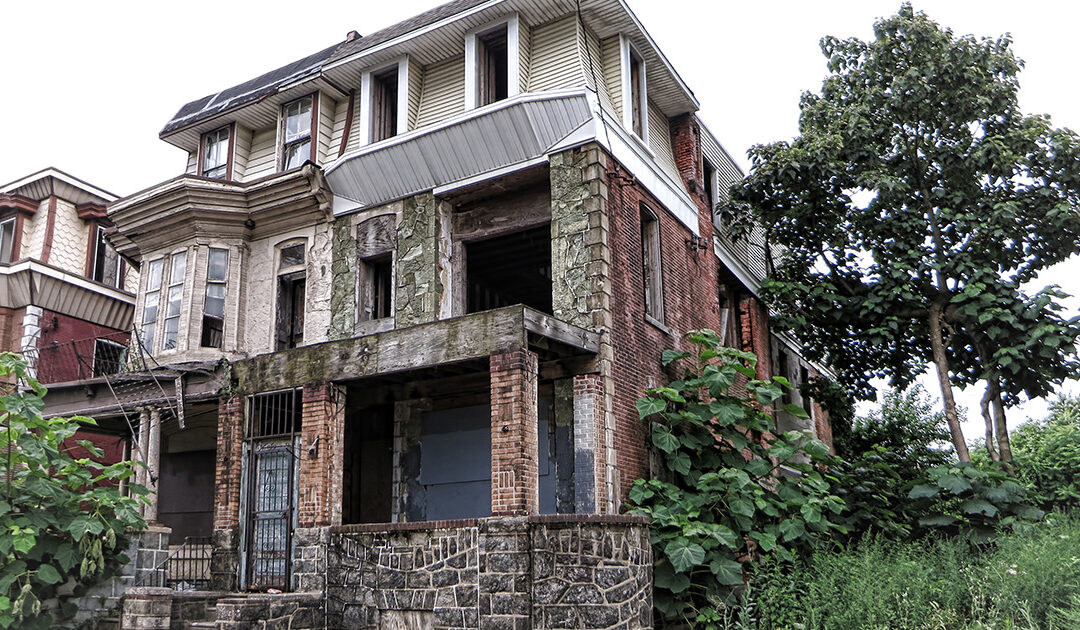
March 26, 2021
Harrisburg – March 26, 2021 – At the request of state Senators Wayne D. Fontana (D- Allegheny), Jim Brewster (D- Allegheny/Westmoreland), Lindsey Williams (D- Allegheny) and Representative Sara Innamorato (D-Allegheny), the Pennsylvania Senate and House Democratic Policy Committees held a virtual public hearing on the issues of abandoned and blighted property conservatorship, the effect of blight on neighborhoods, and tools to eradicate blight while preserving the integrity of communities.
“Making sure that blight does not continue to bring down our thriving communities is of the utmost importance,” Sen. Fontana said. “The premise of Act 135 and all blight remediation legislation are overall positive and essential to eliminating blight. The purpose of this hearing is to examine the act to make sure the law is being used for its intended purpose and make any necessary changes to achieve this goal.”
Act 135 of 2008, the Abandoned and Blighted Property Conservatorship Act, was passed in Pennsylvania to allow responsible owners to take over empty buildings that have become eyesores in neighborhoods for years. Owners are required to act under court supervision, however, there have been housing developers in recent years that have taken advantage of Act 135 cheaply acquire properties.
“I have been an advocate of this kind of blight removal legislation over the years, because run-down and abandoned buildings hamper local communities as they implement development initiatives and attract new opportunities to the area,” said Sen. Brewster. “The legislation discussed today is necessary to support community revitalization efforts and to build stability throughout the region.”
There have been many community organizations and municipalities who have used act 135 to rehabilitate blighted properties and allowed easier access to affordable home ownership to underserved communities. But there are still concerns that in rehabilitating these properties, these neighborhoods are being gentrified.
Brewster said that he expects there to be changes to Act 135 of 2008 after the testimony heard at the policy hearing today.
Ernie Hogan, Executive Director of the Pittsburgh Community Reinvestment Group (PCRG) said, “Since the passing and amendment of the legislation, there have been abuses of the law that have emerged, resulting in lost equity, lost access, and damaging speculation. Our members have told us loud and clear that many neighborhoods have seen unscrupulous investors surface with the desire to speculate and flip real estate, in some cases competing with local neighborhoods organizations.”
“Another shared theme in the tragic story of blight includes the concentration of these properties in areas of existing high poverty and low property values. Places like my neighborhood – far too long ignored by the private market and public investment alike,” Diamonte Walker, Deputy Executive Director of the Urban Redevelopment Authority (URA) of Pittsburgh, said.
“Once it gets started, this vicious cycle of abandonment and blight, leading to further abandonment and blight, is hard to stop. Not to mention that our current ability to reverse the cycle without sparking gentrification is a feat that too rarely occurs,” Walker continued.
Walker emphasized that the issue of blight does fall more heavily on communities of color, and that if the resources are not given directly to the communities that blight and devaluation of property are affecting, this issue will persist. She said that she has been working with Sen. Fontana on changes to the Municipal Claims and Tax Lien Law (MCTLL) to provide for an expedited Sherriff Sale process, currently only available to the City of Philadelphia. Legislation extending this option to Pittsburgh would dramatically enhance the ability of the City, URA, and the land bank to return vacant, abandoned, and tax delinquent property to productive use.
Winnie Branton, Founder and President of Branton Strategies, L.L.C, also spoke about the importance of land banks in Pennsylvania to combat blight and revitalize neighborhoods. A land bank is a governmental entity whose mission is to convert vacant, abandoned, and tax-delinquent properties to productive use. In Pennsylvania, a land bank operates similar to how an area housing authority would. Land banks were established in Pennsylvania by Act 153 of 2012, and there are currently 29 land banks throughout the commonwealth.
As the sergeant in charge of sheriff sales for the Allegheny County Sheriff’s Office, Gina Dascola said that her office is very happy working with the Tri-COG land bank in Allegheny County because it allows them to waive certain fees and tax liens associated with a sheriff sale of a property helps foreclosed properties get rehabilitated more quickly.
While Mandi Culhane, Shareholder with the Pittsburgh based law firm GRB Law, said that waiving tax liens is detrimental to municipalities and their finances, both Ernie Hogan of PCRG and Diamonte Walker of URA disagreed.
Hogan and Walker believe that is more beneficial to communities, and the financial situations of municipalities, to rehabilitate blighted homes and properties to make housing more affordable and get more responsible homeowners on municipal tax rolls.
Gerald Driggs, Director of the Upper Allegheny Valley Community Development Corporation (CDC) said that his organization does not even utilize blight conservatorship as it is currently written into law in Pennsylvania because his organization finds the process too complicated and too expensive.
Driggs and his CDC adopted a strategy called ‘Proactive Blight Remediation’.
“We see blight remediation as a continuum that ranges from demolition to returning a blighted building to the tax rolls while meeting community needs and priorities and creating a viable community asset,” Driggs said.
Driggs also advocated in his testimony for ‘Spot Blight Eminent Domain.’ This form of eminent domain is a tool for a municipality under very specific and regulated circumstances, to take individual properties for redevelopment or rehabilitation, and is designed to transfer blighted properties to responsible new owners in a short timeframe with limited administrative overhead.
“So many of our local municipalities struggle with cost-effective ways to manage blighted properties in a way that both improves the safety and appearance of their neighborhoods and moves these properties off of the delinquent tax rolls,” Sen. Lindsey Williams said. “Learning more about how we as legislators can effectively remove barriers and lower costs for our municipalities while balancing the rights of current property owners, if they exist, and protecting historic properties has been incredibly useful. I’m looking forward to putting this knowledge into legislative action that will help our local leaders and communities.”
“Blight conservatorship, housing equity, and making sure that the laws we have passed here in the legislature are truly serving communities is so important,” Sen. Katie Muth (D-Berks/Chester/Montgomery), chair of the Senate Policy committee, said. “I am grateful for the testifiers here today for presenting possible options on how we can improve polices to eliminate neighborhood blight while still protecting communities.”
Below are all who testified in today’s hearing:
- Ernie Hogan, Executive Director, Pittsburgh Community Reinvestment Group
- Joe Mistick, Professor, Duquesne University School of Law
- Mandi Culhane, Shareholder, GRB Law
- Judy Berkman, Senior Counsel, Regional Housing Legal Services
- Gerald Driggs, Director, Upper Allegheny Valley Community Development Corporation
- Diamonte Walker, Deputy Executive Director, Urban Redevelopment Authority of Pittsburgh
- Gina Dascola, Sergeant, Allegheny County Sheriff’s Office
- Winnie Branton, Founder and President, Branton Strategies, L.L.C
The full recording of this hearing can be found at senatormuth.com/policy or on the PA Senate Democratic Facebook.
###
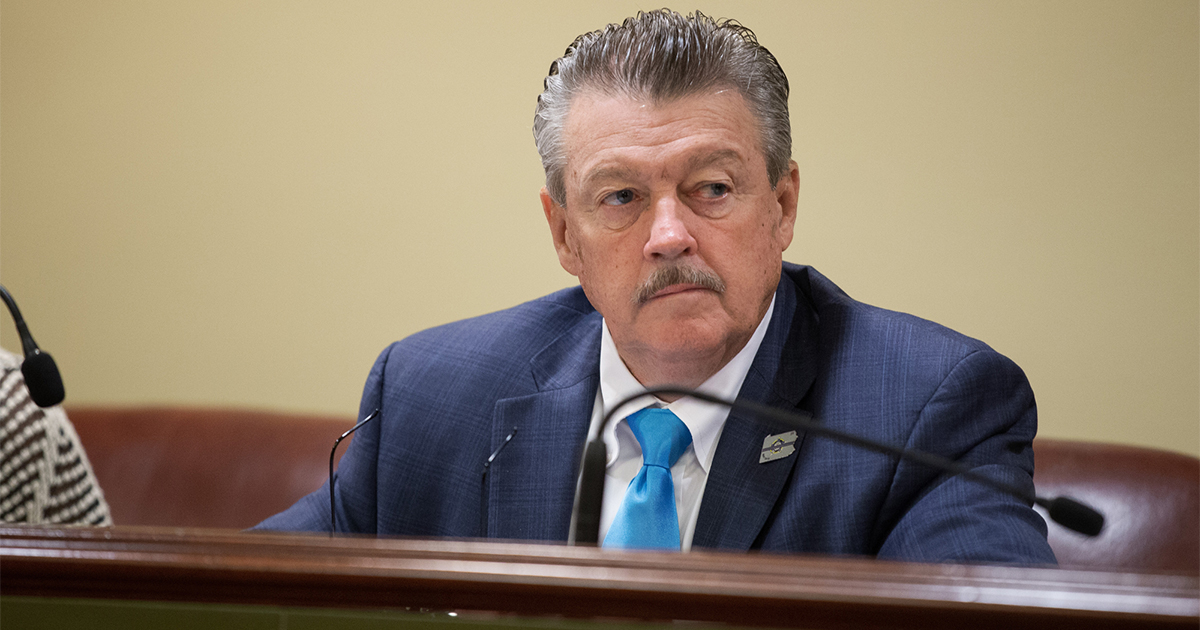
March 16, 2021
HARRISBURG, March 16, 2021 − With an eye toward bolstering trust in elected officials, state Sen. Jim Brewster announced today he has re-introduced a series of bills that will ban per diem payments, automatic pay raises, car leases, and gifts of any value for state lawmakers.
“It’s long past time to eliminate these legislative perks that have cost taxpayers millions and cost their elective representatives the public confidence that is critical to effective government,” Brewster said. “We will have tough decisions ahead as we rebuild our economy and trust has to be restored and sacrifice has to be shared.”
Brewster (D-Allegheny/Westmoreland), first introduced the reform measures in 2015, and has re-introduced them every session since.
“I think the time is ripe for some serious self-reflection in the General Assembly that will give us momentum this time,” he said.
The bills include:
SB 361 – Replaces yearly, automatic cost-of-living adjustments (COLA) by a once-per-decade raise consideration following the decennial U.S. Census and calculated by the Consumer Price Index.
SB 362 – Replaces per diem payments with reimbursement for actual expenses upon sufficient documentation.
SB 363 – Ends state vehicle leases for members of the General Assembly, instead reimbursing for actual milage and tolls for documented government travel.
SB 364 – Bans gifts of any value to members of the General Assembly. No member could solicit or accept, for their personal use or for another’s use; a gift, favor, entertainment, hospitality, loan, or any other item of monetary value.
The bills have been referred to the Senate State Government Committee.
###
























